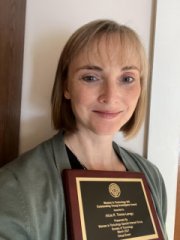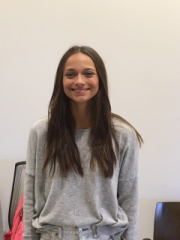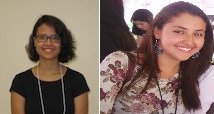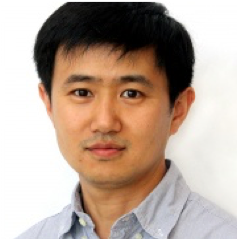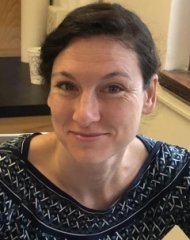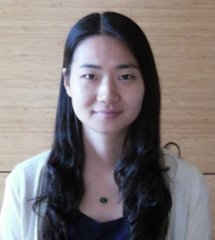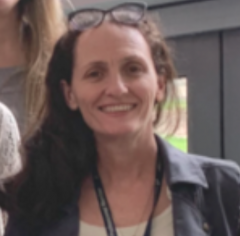News & Announcements
Timme-Laragy Receives Women in Toxicology’s Outstanding Young Investigator Award
Timme-Laragy Receives Women in Toxicology’s Outstanding Young Investigator Award
Associate professor of environmental health sciences Alicia Timme-Laragy received the 2021 Outstanding Young Investigator Award from the Society of Toxicology (SOT) Women in Toxicology Special Interest Group during the SOT’s annual meeting held March 12-26, in a virtual format. The award is given annually to individuals who have made significant contributions to the field of toxicology in the early stage of their careers.
“I am so honored to receive this award,” says Timme-Laragy. “I work with a great team of researchers and students here at UMass, and this award reflects their hard work as well. I’m excited to continue to build my research program and advance the fields of developmental toxicology and redox biology.” Read more
Madeline Tompach named finalist in Three Minute Thesis (3MT) competition
Madeline Tompach named finalist in Three Minute Thesis (3MT) competition
Madeline Tompach (2nd year MCB, Timme-Laragy Lab) has been named a finalist in the Graduate School’s Three Minute Thesis (3MT) competition.
Of the 35 preliminary round participants, 10 were selected as Finalists. These Finalists will compete for a $1,000 first place prize at the Campus Final, with the runner up receiving $500. Additionally, a People’s Choice award ($500) will be selected by audience vote at the virtual final.
The virtual 3MT Final will be held on Thursday, March 18, 4-5:30pm via this link. Mark your calendars so we can all show our support for Madeline in the finals!
Carline Fermino do Rosario and Katherine Chacon-Vargas Awarded Certificates of Recognition for Leading STEM and Social Justice Journal Club
Carline Fermino do Rosario and Katherine Chacon-Vargas Awarded Certificates of Recognition for Leading STEM and Social Justice Journal Club
Katherine Chacon-Vargas and Carline Fermino do Rosario were presented with certificates of recognition for developing and leading the journal club, "STEM and Social Justice: What is my role?" in the Fall 2020 semester. This journal club explored the impact of scientific research on society, specifically the social and health outcomes to marginalized communities and other global social issues that are sometimes underexplored. Students in this journal club reviewed scientific papers and discussed the responsibilities scientists have in social matters, and the roles of implicit bias, and cultural concepts and misconceptions.
The journal club was well attended and was so successful that plans are underway to offer a similar student-run journal club on an annual basis. We are truly grateful to Carline and Katherine for their organization and leadership of the STEM and Social Justice journal club, and for all of their contributions to increase diversity and inclusion in MCB.
Public Engagement Project Announces 2021 Faculty Fellows
Public Engagement Project Announces 2021 Faculty Fellows
The Public Engagement Project (PEP) at the University of Massachusetts Amherst announced the 2021 Public Engagement Faculty Fellows. Seven UMass faculty members from across seven departments and six colleges will draw on their substantial research records to impact policy, the work of practitioners and public debates.
Faculty fellows receive a stipend and technical training in communicating with non-academic audiences. The PEP Fellows Program facilitates connections between fellows and lawmakers on Beacon Hill and in the U.S. Congress, journalists, practitioners and others to share their research beyond the walls of academia. This is the eighth cohort of Public Engagement Faculty Fellows.
The 2021 PEP Faculty Fellows include Dong Wang, associate professor, biochemistry and molecular biology. Wang studies how plants use beneficial bacteria (aka good germs). During the Public Engagement Fellowship, Wang will develop blogs and publications to encourage people to grow their own food locally, year-round, guided by his expert research on what plants like. Read more
UMass Amherst Researchers Gain Insight Into the Biology of a Deadly Fungus
UMass Amherst Researchers Gain Insight Into the Biology of a Deadly Fungus
Researchers at the University of Massachusetts Amherst have gained new insight into the biological processes of a chytrid fungus responsible for a deadly skin infection devastating frog populations worldwide.
Led by cell biologist Lillian Fritz-Laylin, the team describes in a paper published Feb. 8 in Current Biology how the actin networks of Batrachochytrium dendrobatidis (Bd) also serve as an “evolutionary Rosetta Stone,” revealing the loss of cytoskeletal complexity in the fungal kingdom.
“Fungi and animals seem so different, but they are actually pretty closely related,” says Fritz-Laylin, whose lab studies how cells move, which is a central activity in the progression and prevention of many human diseases. “This project, the work of Sarah Prostak in my lab, shows that during early fungal evolution, fungi probably had cells that looked something like our cells, and which could crawl around like our cells do.” Read more
Hazen Named to Dr. Constantine J. Gilgut Professorship in Plant Biology Professorship
Hazen Named to Dr. Constantine J. Gilgut Professorship in Plant Biology Professorship
Samuel P. Hazen, biology, was awarded the Dr. Constantine J. Gilgut Professorship in Plant Biology for a term of three years following approval by the Board of Trustees at its Thursday, Dec. 10 meeting.
The conditions of the Gilgut Professorship specify that the recipient will be a full professor in the biology department and act as the director of the plant biology program. The incumbent of the Gilgut Professorship will be an outstanding, active scholar in the field who can lead by the example of his or her teaching as well as scholarship and administrative skills.
Hazen’s area of research is the thickening of the secondary cell wall and the regulation of this process in the grass Brachypodium distachyon and a variety of other plants. He has received substantial external funding to support his research from the National Science Foundation and the Department of Energy. He also received several awards to support small business innovation and community science projects. Hazen has published 47 articles in peer-reviewed journals, and his work has been cited over 5,200 times according to Google Scholar. Read more
Kiserian Jackson Awarded CBI Traineeship
Kiserian Jackson Awarded CBI Traineeship
Kiserian Jackson (Siegrist lab) received a prestigious NIH-funded traineeship from the Chemistry-Biology Interface program! The CBI program trains students with diverse scientific backgrounds for productive research at the interface between chemistry and biology. Science at the chemistry-biology interface brings the synthetic, mechanistic and analytical powers of chemistry to bear on new and exciting areas of biology. CBI Trainees take part in courses, seminars, discussions and research at the forefront of this emerging, interdisciplinary field. Trainee selection criteria include progress in the PhD program (grades and research productivity), and in the CBI Program (requirements satisfied, event participation). Past performance, such as undergraduate GPA, is also taken into account. CBI students must be nominated by CBI Training Faculty in spring of their first or second year of graduate study to be considered for traineeships. Congratulations, Kiserian! Read more
Yingying Geng PhD Dissertation Defense
Yingying Geng PhD Dissertation Defense
Tuesday, January 26, 2021
2:00 PM
Zoom link: Please contact mcb@mcb.umass.edu to be included on the email list for this announcement
Dissertation Title: "Rapid cell phenotyping using nanosensors: Applications in cancer stem cell therapeutics and high-content screening"
Advisor: Vincent Rotello
Two VASCI Faculty Receive Major NIH Grants from its Knockout Mouse Project
Two VASCI Faculty Receive Major NIH Grants from its Knockout Mouse Project
UMass Amherst veterinary and animal science researchers Kim Tremblay and Jesse Mager, a wife-and-husband team nationally known for expertise in embryonic development, have each received five-year awards from the National Institutes of Health (NIH) to study distinct stages of embryo development in mice that have had essential genes knocked out. They will collaborate with Wei Cui, director of the Animal Models Core at the campus’s Institute for Applied Life Sciences.
Specifically, Mager and Tremblay, who are co-investigators on each other’s grants, have chosen to investigate a large number of lethal genes whose function is not well understood or not studied at all. These knock-out animals are produced by the Knockout Mouse Project (KOMP), part of the international mouse phenotyping consortium (IMPC), a global effort to identify the function of every protein-coding gene in the mouse genome. Mager says, “We chose to study things that nobody else has, because the idea and goal of the project is not to re-do the effort but to contribute to this library of knowledge on what each and every gene does.” Mager will receive $3.1 million for his research and Tremblay will receive $2.1 million for her studies of the KOMP gene’s role in embryonic organ formation. Read more
Embryologist Kim Tremblay Will Explore the Secrets of Liver Regeneration
Embryologist Kim Tremblay Will Explore the Secrets of Liver Regeneration
Scientists have known since ancient times, as notable in Greek mythology, that liver tissue has a remarkable ability to regenerate, but embryologist Kim Tremblay, veterinary and animal sciences, says, “We still don’t know how it does that, it’s still a mystery even after two thousand years.”
She now has a five-year, $1.4 million grant from the NIH’s National Institute of Diabetes and Digestive and Kidney Diseases to investigate how the organ can replace itself in an amazingly short time. “Unlike any of our other organs, if you cut out two-thirds of your liver, it will grow back in seven days,” she says. “What’s amazing about that time is that in many organisms that have a liver, it can grow back in seven days.”
The liver filters impurities, toxins, alcohol and drugs, for example, from the bloodstream, which kills many cells, so in a sense it’s not surprising that the organ can quickly respond to injury by making new ones, Tremblay says. “There is a reservoir of cells that replace the dead ones. The liver has a huge number of regenerative or homeostatic cues that trigger this, but we have not yet established which cells are responsible for this.” Read more
